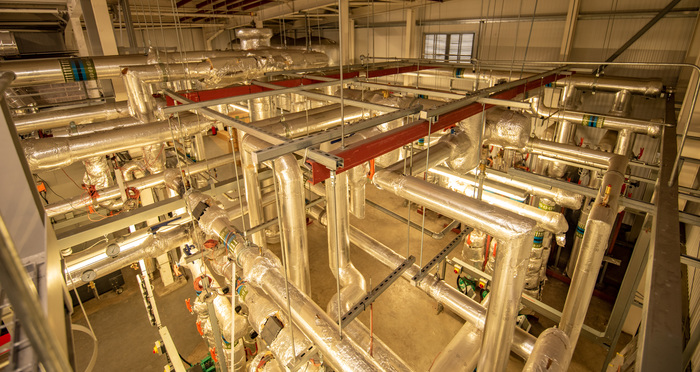Revised Heat in Buildings Bill to be brought forward this year

The Scottish Government has pledged to bring forward its Heat in Buildings Bill during this parliament after revealing revisions that will set a new target for decarbonising heating systems alongside continuing work to reduce fuel poverty.
Whilst the Scottish Government said it would continue to pursue a move away from carbon-emitting heating systems by 2045, the focus would now be on supporting change through government targets rather than penalising individuals and property owners. Acting minister for climate action Alasdair Allan also said the Bill would boost the development of heat networks, and take a technology-neutral approach, thereby allowing the use of bioenergy.
Initially drafted by the Scottish Greens under the Bute House Agreement, the legislation is a key element of a strategy to decarbonise buildings and contribute towards Scotland’s net zero targets.
However, acting cabinet secretary for net zero and energy Gillian Martin announced a delay to the legislation in March, citing concerns over the potential financial costs being placed on individual homeowners.
Yesterday, Dr Allan confirmed the Scottish Government’s intention to bring forward a revised Bill for consideration by the Scottish Parliament later this year.
The revised Bill will now include:
- A target for decarbonising heating systems by 2045, which the Scottish Government said will send a strong signal to homeowners, landlords and other building owners on the need to prepare for change while outlining collective actions to help do this.
- Provisions to boost heat network development by developing requirements for large, non-domestic premises, including powers to require public sector buildings to connect to district heating when available.
- Powers to set minimum energy efficiency standards for owner/occupier and non-domestic properties, subject to further consideration. Regulations will be progressed under existing powers to introduce a minimum energy efficiency standard in the private rented sector.
Dr Allan said: “It is vital that we find the right balance both to reach net zero by 2045, and reduce fuel poverty.
“Many households, families and businesses are facing difficult circumstances right now and it is simply unaffordable for many building owners to make great changes in the near future – particularly for those in rural and island locations, whose needs and circumstances we must continue to consider carefully.
“Our plan to deliver a revised Bill responds to the legitimate reservations and concerns raised since our consultation completed, including the risk of exacerbating fuel poverty and burdening every individual householder with an overly onerous responsibility as we decarbonise.
“Instead of placing prohibitions on every homeowner, we will establish targets for Government to reach. Rather than looking at action through the lens of decarbonising alone, we will also commit to doing everything within our power to reduce costs for people.”
According to the government, the proposed Bill will remain technology-neutral, reflecting that different properties and people will require different solutions – for example, clean heating solutions in some remote and rural areas may vary from urban areas.
The Bill would accompany related work on a Social Housing Net Zero Standard and reform of Energy Performance Certificates under existing powers.
Dr Allan also welcomed the second report by the independent Green Heat Finance taskforce, which also takes a collective approach, focusing on options for financing place-based solutions, heat networks and social housing retrofit.
He added: “This report makes a very important contribution to our understanding of the work we need to do to boost clean heat demand amongst consumers and instil market confidence to develop new products, including financing solutions.
“It also identifies key steps the UK Government needs to take to stimulate the clean heat market and reduce fuel poverty, in particular emphasising the importance of rebalancing relative gas and electricity prices, which we continue to push for.”
The Existing Homes Alliance has called for clear, achievable targets and standards on zero-emission heating and energy efficiency, as well as an expanded framework of advice and support to help people upgrade their homes.
Last month, the coalition of housing, environmental, fuel poverty, consumer and industry organisations showcased wide support for the Bill’s introduction to give confidence to the industry and kickstart investment in jobs and skills.
Lori McElroy, chair of the Existing Homes Alliance, said: “Bringing forward the right Heat in Buildings Bill is an opportunity to put Scotland back at the forefront of tackling climate change and fuel poverty. It’s good to see some progress is being made on this after months of delay and we welcome early action on improving energy efficiency in the private rented sector.
“However, we are concerned that what has been suggested may not be sufficient to get us to net zero by 2045. A target-based approach must have a robust delivery plan and this must be forthcoming this year.
“A strong Bill that includes clear, achievable targets and standards on zero emissions heating and energy efficiency in homes is essential to provide much needed clarity for homeowners, landlords and businesses.
“It must protect the most vulnerable by including a requirement that the regulations contribute to tackling fuel poverty. Decarbonising heating should be phased in over time, so that industry can scale up to meet growing demand. It must include appropriate exemptions and exclusions, so that it gives clarity and certainty, while also being achievable and affordable.
“The Bill must be introduced soon to ensure sufficient time for parliamentary scrutiny, and we look forward to working constructively with the Scottish Government over the coming weeks to ensure the Bill is introduced in good time and avoids further delay.
“However, regulations will not work on their own. Alongside the Bill, we need an expanded framework of advice and support to help people upgrade their homes. That includes continued grant and loan support and long-term affordable financing, so people are not financially worse off. Now that the long awaited Green Heat Finance Taskforce report has been published, the Scottish Government must take forward recommendations and work to roll out affordable financing mechanisms, so warm, healthy homes are more affordable to more people.”
SFHA’s director of external affairs, Carolyn Lochhead, said: “It’s good news that the Scottish Government has committed to introduce a Heat in Buildings Bill during this parliament.
“Our members have already worked hard to decarbonise their social homes, but if they are to continue this then we need greater clarity on the expected standards across the sector.
“The intention to introduce minimum energy efficiency standards in the Private Rented Sector is also a step in the right direction- SFHA has consistently argued that improved energy standards should apply to all types of housing.
“Alongside development of the new Heat in Buildings Bill we now need to see progress on the Social Housing Net Zero Heat Standard and for the Scottish Government to act on the recommendations of the Green Heat Finance Taskforce.
“In particular, we need to see funding solutions for social housing retrofit to ensure tenants do not foot the bill for the move to clean heating systems through higher rents.”
Changes to the Bill have also been welcomed by Scottish Land & Estates, which said the new approach showed increased recognition of the unique challenges faced by rural and island communities in transitioning to zero-emission heating systems.
However, the rural organisation urged the government to provide certainty over the minister’s statement that all rented property “as far as possible” would need to meet the equivalent of EPC C and that such regulations are to be progressed under “existing powers”.
Anna Gardiner, policy adviser (rural property) at Scottish Land & Estates, said: “We are pleased to see a more balanced approach to heating regulations, one that acknowledges the significant differences between urban and rural Scotland.
“Rural communities face distinct challenges, from infrastructure limitations to higher upfront costs, and it is positive to see these factors being acknowledged in policymaking.
“People in rural and island areas experience significantly higher rates of fuel poverty than those in more accessible regions. By moving to the carrot rather than the stick, the Minister has demonstrated a willingness to work with communities to find realistic and effective solutions.
“The emphasis on heat networks and bioenergy is also a step in the right direction. Encouraging investment in these technologies will be vital to ensuring that rural and island communities can access sustainable heating solutions that are both effective and affordable.
“We do, however, hold real concerns regarding the vagueness of approach on rental properties meeting EPC C.
“While we support the ambition to improve energy efficiency in the rental sector, we need clear guidance and support mechanisms to ensure that property owners can meet these targets in a fair and practical way.
“There also needs to proper scrutiny by parliament and consultation with the sector over any such proposal, rather than using existing powers to introduce new requirements via the back door. Certainty over what is required will be essential to achieving compliance without unintended consequences for rural housing supply.”
The new Bill’s requirement for public sector buildings to connect to heat networks where possible has also been commended.
Vattenfall’s director of Scotland heat networks, Eoghan Maguire, said: “This is very encouraging news for all the buildings about to connect to a heat network and it’s important that the policy is implemented quickly. Heat networks are more reliable and resilient, and those buildings will benefit from a significantly enhanced service.
“The Scottish Government has listened to industry and made a really positive decision that will transform the way buildings get their heating and hot water. It has also given heat network operators much more certainty to invest in nationally important, strategic infrastructure that will be at the heart of Scotland’s low carbon future.”
Nicola Mahmood, head of Scotland at heat pump installer Aira, added: “The long-awaited Heat in Buildings Bill is a pivotal opportunity for the SNP government to tackle nearly a fifth of Scotland’s emissions—the direct result of burning fossil fuels to heat our homes. Since Russia’s full-scale invasion of Ukraine, Scots have endured skyrocketing gas bills, proving beyond doubt that gas is neither stable, affordable, nor sustainable for our homes or economy.
“The demand for clean, cost-effective heating is undeniable. In 2024 alone, heat pump installations surged by 20%, demonstrating that Scots are ready to embrace change. The government’s own analysis, published alongside the Heat in Buildings Bill, reinforces what we already know: heat pumps are a credible, more efficient, and cheaper-to-run alternative to gas boilers.
“We welcome the minister’s commitment to fully decommission the gas grid by 2045—but the government must go further and faster. Expanding schemes like Home Energy Scotland is essential to reducing our reliance on imported fossil fuels and ensuring a cleaner, more resilient energy future for Scotland.”
Timothy Douglas, head of policy and campaigns at Propertymark, added: “Propertymark recognises the need to cut carbon emissions from buildings and homes, but the issue has always been how we do it. Following the Minister’s statement, it is pleasing that the Scottish Government is revising its focus overall to be less prescriptive. This is because Propertymark has long called for policy makers to avoid a one-size-fits-all approach to energy efficiency, so words especially around how different properties and people require different solutions and being technology neutral is positive.
“However, what landlords and homeowners need now is certainty. Questions remain about how much landlords and homeowners will need to invest in their properties, when EPC targets need to be met and what financial support can be accessed. Until these questions are answered, it is likely that the Scottish Government will struggle to meet their net zero targets.”









